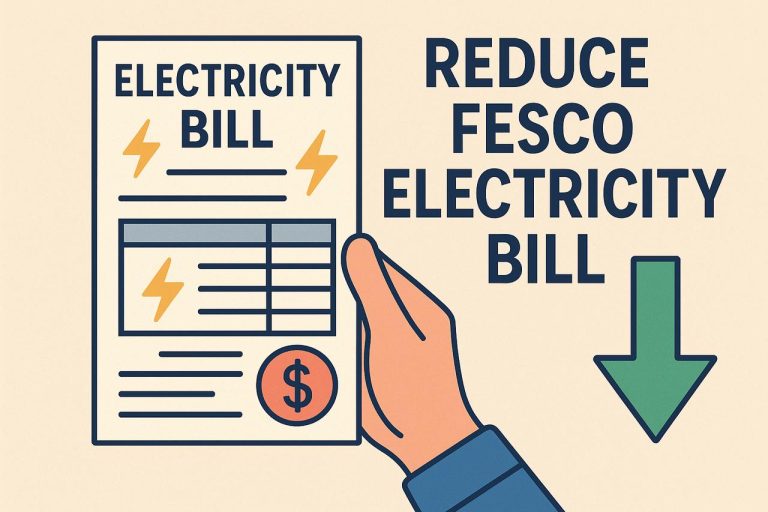Peak Hour Tricks to Lower Your Bill in Pakistan
Electricity bills are one of the biggest monthly expenses for households in Pakistan. Whether you live in Faisalabad under FESCO, in Multan under MEPCO, or any other region managed by WAPDA distribution companies, one thing is common: bills shoot up if you use appliances during peak hours.
But the good news is that with a little planning, you can shift your electricity usage to non-peak timings and save thousands of rupees every year. In this article, we’ll explore peak hour tricks to lower your bill, understand how NEPRA defines peak hours, and discuss practical solutions that work for both urban and rural households.

What Are Peak Hours in Pakistan?
In Pakistan, NEPRA (National Electric Power Regulatory Authority) defines peak and off-peak timings for electricity usage.
- Peak hours = Time slots when electricity demand is highest. Units consumed in this period cost more per kWh.
- Off-peak hours = Electricity is relatively cheaper during these hours.
Fesco Peak Hours Breakdown
As of 2025, most DISCOs (including FESCO, MEPCO, LESCO, GEPCO) have:
- Peak hours: 6:30 PM – 10:30 PM
- December to February: 5 PM to 9 PM
- March to May: 6 PM to 10 PM
- June to August: 7 PM to 11 PM
- September to November: 6 PM to 10 PM
- Off-peak hours: All other times
Why Do Peak Hours Matter for Your Bill?
Electricity rates in Pakistan are time-of-use based, especially for consumers with TOU meters. Using heavy appliances like ACs, heaters, washing machines, or irons from 6:30 PM to 10:30 PM means you’ll be charged at a much higher rate per unit.
For example:
- Off-peak unit cost ≈ Rs. 35
- Peak hour unit cost ≈ Rs. 55 (varies by region and quarter)
If you run a 1.5-ton AC for 4 hours during peak hours, your monthly bill can rise by Rs. 3,500 – 4,000 extra compared to running it at night or early morning.
Peak Hour Tricks to Lower Your Bill
Here are practical tips you can apply today:
1. Shift Heavy Usage to Off-Peak Hours
Appliances that consume more electricity include:
- Air Conditioners
- Electric Water Heaters
- Washing Machines & Dryers
- Microwave Ovens
- Iron
Run them after 10:30 PM or before 6:30 PM to enjoy cheaper unit rates.
2. Use Energy-Efficient Appliances
If your appliances are old, they consume more power. Switching to:
- Inverter ACs (40% less electricity)
- LED lights (80% savings vs bulbs)
- Energy Star refrigerators
can drastically reduce costs even during off-peak times.
3. Plan Meal Prep Outside Peak Hours
Cooking with electric stoves, microwaves, or ovens during peak hours adds unnecessary load. Try:
- Preparing food before 6:30 PM
- Using gas stoves for peak-time cooking
- Heating meals later in the microwave after 10:30 PM
4. Run Washing Machines at Night
Washing machines and dryers are major electricity guzzlers. Set a timer and let them run late at night or early morning. Not only will this save money, but it will also reduce pressure on the grid during high demand.
5. Iron Clothes in the Morning
Instead of ironing clothes right before dinner or late evening, shift the activity to early morning or off-peak slots. Even better, iron in bulk to reduce frequent electricity usage.
6. Switch Off Phantom Loads
Devices like routers, chargers, laptops, and LED TVs consume electricity even when not in use. During peak hours, make sure to:
- Unplug chargers
- Switch off Wi-Fi routers if not needed
- Use smart plugs with timers
7. Invest in Solar Panels (Hybrid Systems)
If you can afford the upfront investment, a net-metering solar system can completely eliminate peak-hour stress. Solar energy runs during the day, while stored battery backup can cover evening peak hours. Many households under FESCO are already saving huge amounts with this method.
8. Use Smart Home Solutions
Smart meters and apps help track real-time consumption. This way, you know exactly how much extra you’re paying during peak hours, motivating you to adjust habits.
Case Study: A Family in Faisalabad
A middle-class household using:
- 1 AC
- 1 washing machine
- 10 LED bulbs
- 2 fans
- 1 refrigerator
Switched washing, ironing, and cooking outside peak hours. Result?
- Monthly savings: ~Rs. 2,800 – Rs. 4,000
- Yearly savings: ~Rs. 36,000 – Rs. 48,000
That’s equal to paying one/two months’ electricity bill free every year!
Broader Benefits of Off-Peak Usage
- Reduces load-shedding: Less stress on the grid during peak demand
- Supports sustainable energy: More balanced electricity flow helps integrate solar/wind energy
- Improves appliance life: Using appliances in cooler off-peak hours (like night) reduces wear and tear
Final Thoughts
Paying attention to peak hours is not just about lowering your bill – it’s about responsible electricity usage. By making small adjustments, such as ironing clothes in the morning, running washing machines at night, and avoiding AC use between 6:30 PM and 10:30 PM, you can save thousands of rupees annually.
Electricity is getting expensive in Pakistan, but smarter usage can keep your monthly bill manageable. Start with one trick today – your wallet will thank you later!
Want to check your latest FESCO bill online and track consumption patterns? Visit fescobilling.pk and get instant updates.






